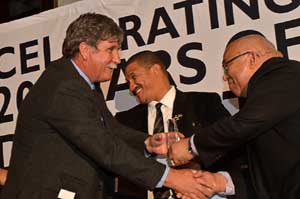
Cassie Kruger, False Bay TVET College Chief Executive Officer and Principal accepting the National Disability Higher Education Institution award from Albert Fritz, MEC of Social Development in the Western Cape
The College received the National Disability Higher Education Institution Award 2014 for supporting the advancement of people with disabilities. Within the context of the National Disability Rights Awareness Month, the awards were conceived as a partnership between the Department of Social Development and INSETA as part of South Africa's 20 Year Democracy celebrations.
The first National Disability Awards were successfully run in 2009. The first HE award was awarded in 2012 to WITS University.
"The White Paper for Post-School Education and Training, November 2013, recognises Inclusive Education as a national priority.The DHET will develop a strategic policy framework to guide the improvement of access to and success in post-school education and training for people with disabilities."
"Inclusive Education remains a strategic priority of False Bay TVET College," says Karin Hendricks, Deputy Principal of Education and Training.
She adds: "The College employs two full-time Inclusive Education Officers who are qualified occupational therapists to assess Students with Disabilities (SWD) in order to evaluate and advisestudents on study options and to develop an individual support plan to assist the student in coping with barriers."
False Bay College is the only TVET Institution that employs two qualified Occupational Therapists to assist students with disabilities across its 5 campuses. In 2014, 4.5% of the total registered Full Time Equivalents (FTE's) were students with disabilities. These 158 students were registered in NC(V), Nated and Occupational Programmes. The Commission for Employment Equity Annual Report indicates a national disability target of 2%.
Highlights
Networking and awareness
- National Disability Casual Day campaign was implemented on all campuses and the central office (in aid of Lentegeur LSEN school);
- Engagement with WCED and presentations for Special Needs Education Directorate;
- Engagement with NGO's such as LOFOB, CTSB, Epilepsy SA, CP Association of SA, Cape Mental Health, DG Murray Trust, etc. and other health professionals in terms of networking;
- Supervising, coaching and mentoring for University of Cape Town (UCT ) Occupational Therapist (OT) department - six 4th year students and six 1st years;
- Assessments of these students completed and continued communication with academic supervisors of UCT OT department.
Awareness
- Lecturers' Lounge: developed and continuous loading material and marketing/advertising of this resource;
- Presentation at UCT Disability Studies Seminar series on Disability Inclusive Developments;
- False Bay TVET College Membership to Higher Education Disability of South Africa(HEDSA).
Sharing of Best Practices
With Northlink, Orbit and Ekhala (referred by NMMU) Colleges , who have sought ongoing advice with regard to False Bay College Inclusive Education Practices and Procedures and Policy;Western Cape Education Department, Enforce, Cafda School of Skills, DG Murray Trust and Cape Mental Health all required input.
Looking ahead to 2015
The VARK Project implementation: It started in 2014 as a pilot study and will be implemented at the College's Muizenberg and Khayelitsha campuses. This will be offered to all new students of the college.
VARK is an acronym for Visual, Auditory, Reading and Kinaesthetic. VARK is a questionnaire that provides users with a profile of their learning preferences. These preferences are about the ways that they want to take in and present information.